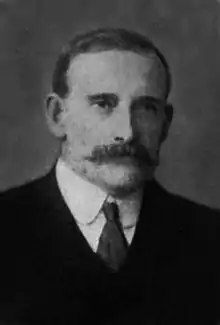Joseph Bell (engineer)
Joseph Bell (12 March 1861 – 15 April 1912) was a British engineer who served as chief engineer in the engine room of RMS Titanic.
Joseph Bell | |
|---|---|
 Joseph Bell | |
| Born | 12 March 1861 Farlam, England, UK |
| Died | 15 April 1912 (aged 51) RMS Titanic, Atlantic Ocean |
| Spouse(s) | Maud Bates |
| Children | 4 |
First years and training
Firstborn Son of John Bell, Sr. and Margaret Watson, both agricultural entrepreneurs, Joseph Bell grew up in Farlam, a small village belonging to the municipality of Brampton, in the county of Cumbria; he had three siblings: Jane (1864), Richard (1865) and John jr. (1868).[1] His mother Margaret died shortly after giving birth to her last child.
Joseph Bell, initially, attended as a child a private elementary school in the village of Farlam and, after the death of his mother, he moved with his father and his brothers to Carlisle, between the districts of Edentown and Stanwix; Joseph and the brothers attended Carlisle's Academy William Harrison. In time, the younger brother John decided to migrate to Australia, embarking on the transatlantic SS Great Britain, while the rest of the family remained in Carlisle.
After leaving Carlisle, Joseph Bell moved to Newcastle, doing apprenticeship as an engine editor at Robert Stephenson and Company.[1] In 1885, Bell was hired by the White Star Line and worked on many ships that traded with New Zealand and the United States. In 1891 he was promoted to chief mechanical engineer.
Sister Jane married William Hugh Lowthian in 1886 and spent many years living in Ripley, Derbyshire, where he was a bank manager. It was probably at this time that Joseph met Maud Bates, whom he married in 1893; the couple had 4 children: Frances John, called Frank (1896), Marjorie Clare (1899), Eileen Maud (1901), and Ralph Douglas (1908).
In 1911, Joseph found lodging in Belfast, along with his wife and younger son. The two daughters remained at Ripley, cared for by both a housekeeper and her uncles (Bell's sister and brother-in-law), while the then fifteen-year-old Frank was studying at the Grosvenor College in Carlisle and later an apprenticeship at the Harland and Wolff shipyards.
On the Titanic
After serving on the Olympic, he transferred to the Titanic, where he was given the post of chief engineer. On the night of April 14, shortly before the Titanic hit an iceberg, Bell received an order from the bridge to either stop or reverse the engines (accounts vary), in an attempt to slow the ship. Despite the crew's best efforts, the Titanic could not avoid the immense block of ice. As the ship began to sink, Bell and the engineers remained in the engine room, urging the stokers and firemen to keep the boilers active, allowing the pumps to continue their work and ensuring the electricity remained on as long as possible. According to legend, Bell and his men worked until the last minute to keep the lights and the power on in order for distress signals to get out. Bell and all of the engineers died in the bowels of the Titanic most likely in the Electric Engine Room and the Switchboard Platform in the Turbine Engine Room. According to the historical record, when it became obvious that nothing more could be done, and the flooding was too severe for the pumps to cope, they all came up onto Titanic's open well deck, but by this time all the lifeboats had already left. Greaser Frederick Scott testified to seeing all the engineers gathered at the aft end of the starboard Boat Deck at the end.[2][3] Bell's body was never recovered.
After Bell's death, the wife and the brother-in-law, William Ralph, inherited the farm of Farlam, of which Joseph had become its full owner since 1904, after his father's death; the farm was immediately sold because both Bell's wife and children never went to Farlam.
At the Church of the Holy Faith in Waterloo, near Liverpool, a plate has been affixed to commemorate Bell; an epitaph was also erected in his memory in the small cemetery of Farlam.
Portrayals
- Emerton Court (1958; A Night to Remember)
- Terry Forrestal (1997; Titanic)
- David Wilmot (2012; Saving The Titanic; PBS TV Movie)
References
- "The Crew". The Guardian. 16 April 1912. p. 9. Retrieved 12 June 2020 – via Newspapers.com.
- "Day 6 - Testimony of Frederick Scott (Greaser, SS Titanic)". British Wreck Commissioner's Inquiry. 10 May 1912. Retrieved 9 April 2020.
- 101 Things You Thought You Knew about the Titanic - But Didn't! at Google Books.co.uk
Further reading
- Hodgson, Barrie B.; Freer, Ann (2013). Tarn to Titanic: Life and Times of Joseph Bell Chief Engineer (1st ed.). Clearline Assistance UK Ltd. ISBN 978-0956050625.
External links
- Joseph Bell, Chief Engineer on the R.M.S. Titanic at WordPress